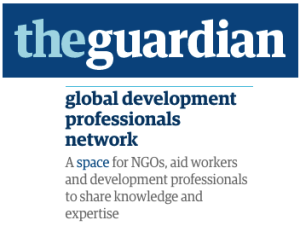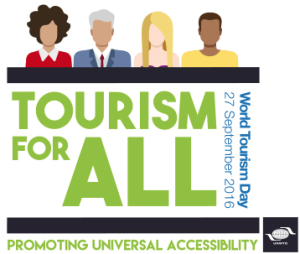 I saw a headline recently from the Secret aid worker series from the Global development professionals network in The Guardian:
I saw a headline recently from the Secret aid worker series from the Global development professionals network in The Guardian:
I’m sick of job rejections – is humanitarian work only for the elite?
The headline struck me, as I constantly read questions on Quora and YahooAnswers from people that want to work in humanitarian aid and development. The questions are so frequent, and so similar, that I created a page of answers to that specific question, and I point people to it often.
Unfortunately, comments on this particular Guardian blog are closed. But I really wanted to respond to it, specifically, not just refer the author to my web page for people like her.
The blogger says she longed for a development job abroad “where I would get to do something real – responding to crises, spearheading interventions and doing hands-on development.” But then she never says anything about her own experience responding to crises, spearheading interventions and “doing hands-on development” anywhere. She never once says, “Here’s my area of expertise, here’s what I’ve proven myself capable of doing that is transferable and needed in the developing world.” She just goes on and on about a desire to work in development.
She’s now “hoping a year in INGO corporate fundraising and some experience in publicity and campaigns can help give me an edge in getting a job that’s a little more hands-on, because that was all the experience I could get. Development is a subject I’ve been passionate about for over five years.”
Again, she never says what it is she has that development agencies really, really need. A year of experience doing one thing, some experience in something else? Passion? Sorry, but it isn’t enough to give you an edge. Not at all.
“I can’t help but feel that humanitarian and development work is for the elites.”
No. But it is for people that have the skills and experience actually needed by local people in post-conflict zones and transitional nations.
Look, I don’t mean to sound mean, but in addition to be a person that seeks work in development – more on that later – I’ve been on the hiring side of things at development agencies. I’ve been on the job development side of things as well. I’ve written the description of the job that we need someone to do, and never once have I thought, “Hey, let’s give this to someone who doesn’t have experience but, by golly, they really want to work in aid and development! As long as they have a Master’s Degree!” The people I serve – the local people of a developing country – want more. They deserve more.
I think for anyone that wants to work in aid work, this blog by Marianne Elliott, Why Your Passion Is Not Enough, is worth reading, particularly this part:
My point is that passion, perseverance and innovation are sometimes highlighted at the expense of professionalism… much more than passion is needed in order to make a positive difference in the world… Just as passionate persistence without professional skills won’t get you a part in The Hobbit, good intentions without professional skill won’t result in doing the good you intend.
I am sometimes invited to talk to university students that want to work in aid and development. One thing I say to every class: to get paid to do something abroad you have to have done it locally in your own community, or somewhere in your own country. You want to help people start micro enterprises? You want to educate young people about HIV/AIDS? You want to open a school? You want to help people become motorcycle mechanics? You want to help respond to a post-disaster situation? You want to help refugrees? Whatever it is, you have to have done it in your own country – why would anyone want to hire you to do something you’ve never done before?
You can pursue such as entry-level paid work at local NGOs and nonprofits and maybe even in government programs, to get that experience. But I warn you, it’s really low-paid when you do it locally in your own country. Or you can do it as a volunteer, outside of your better-paid non-humanitarian work. I was stunned when I interviewed for my first job with UNDP, and one of the interviewers focused in on my volunteer work in communications for an abortion-rights group. He was interested because he wanted to hear about when I’ve had to communicate about a contentious, controversial issue that can bring out people’s hostilities, how I’ve navigated deeply religious communities, and how I’ve communicated about legislation and science. He didn’t care that I did it “just as a volunteer” – the work was real, and he wanted to hear about it. I’ve never forgotten that moment.
I am sympathetic to the person that says they cannot afford to take a low-paying job with a local NGO or nonprofit to get the experience in a field in which they want to build experience. I’m sympathetic to the person that says they cannot afford a Master’s degree. I’m not only sympathetic to people that cannot take unpaid internships at development agencies, but also outraged that they are expected to work full time for no pay. But I’m not sympathetic to someone who says, “I don’t have time to volunteer to gain experience so I can get a job in humanitarian work” or “I don’t want to spend a year or more gaining this experience just through volunteering.” Unless you don’t have time to volunteer because you are a primary caregiver to a family member – in which case you cannot be a humanitarian aid worker anyway – you can make the time. Here’s how: unplug your TV and cancel your Netflix subscription. Ta da: all the time you need. You have to set times and days when you would be able to go onsite to an organization to volunteer, and orient your social life and out-of-work responsibilities around that schedule. If you want to engage in virtual volunteering as well, that’s fine, but you are also going to set times to do the tasks you want to undertake. And this time for volunteering (and experience-gaining) can happen outside of work hours, in case you are having to do paid work outside of your career field in make ends meet. You have to make gaining the experience you need a priority – no whining.
But just as you can’t get an aid job solely based on your desire for such, you can’t get a volunteering gig that will give you the skills you need for an aid job solely because you call a nonprofit and ask for such. Just like a paid job, you are going to have to map the various nonprofits in your area – those that work with immigrants, or formerly incarcerated people, or victims of domestic violence, or young people that need tutoring, or those helping people train for new jobs, or people educating re: HIV/AIDS, etc. – and research them in terms of what they do and how they currently engage volunteers, and get to know them, approach them, go through their application process, and try, try again. You may have to work with an organization for many months before you get to move into the kind of work you really want to do. And you will have to work for many months, maybe longer, to design and undertake your own project that will have a big impact locally and showcase your talents for your CV.
Job hunting is frustrating for most people, even me. Since 2009, I’ve found it far easier to get international placements than to get a job, short-term or permanent, with a local nonprofit or local government agency in my own county; I can’t decide if local agencies think I sound too good to be true or if they think I’m overqualified for the jobs I’m applying for. But if you think aid work is only for the elites, consider this: I’ve had three jobs with the United Nations, and I didn’t get any of them because someone already at the agency put in a good word for me, or because I went to some elite university (I went to a public university in Kentucky you have probably never heard of). None of the jobs were in the same country, and none had offices where anyone knew me, had worked with me, etc. I got all three because of my skills and experience. I was just an applicant for those three jobs, like everyone else. I actually did some digging to find out how I got the attention of the three hiring managers for each of these jobs. The first was because the job was created for me – I happened to be the most well-qualified expert in the world regarding a very particular subject – virtual volunteering – and this was precisely what was needed. The second job was because I had been a part of UNDP and had a robust communications management background, and not just at the UN – they didn’t really care anything about virtual volunteering, but they did care that the UN’s Online Volunteering service branding and other marketing success was directed by me. The third was again because I had been a part of the United Nations and had a robust communications background, with the addition of having lived in a post-conflict zone – and in that job, I was the third choice for the position (first two folks turned it down), and what got them to really read my CV was my comment at the very end that I ride a motorcycle! And for the record, I’ve applied for far, far, far more international development jobs that didn’t even get an interview for than jobs I did get an offer for. And I still volunteer as my way of keeping my skills sharp, to expand my skills, and to keep learning.
Do unqualified people get hired for humanitarian jobs? Do friends-of-friends, and family members of some connected someone, get hired over qualified people? Do applicants get rejected because of really dumb reasons, like because someone reviewing CVs thinks someone is too old or too young, despite their experience? Sure – just like in the corporate world. It happens because humanitarian agencies are run by humans, and humans are profoundly fallible.
Is a career in international development out-of-reach of people from certain economic classes, because they cannot afford the education? Absolutely – just like being a banker or a doctor or a lawyer or a teacher or so many other professions. I wish it wasn’t true. And I’ll go even farther: there is a strain of racism in the choice of who gets to be an aid worker that no one is talking about. A black Peace Corps member has challenges never faced by a white Peace Corps member, and black American applicants and black African applicants face obstacles as well, yet I don’t hear many people talking about that. And then there are the challenges for women, as applicants and actual workers…
But even with all those admissions, I stand by the belief that working in international development is not just for the elite. Get the skills and experience needed and learn another language well enough to work in it – it won’t be easy, but it can be done.
Also see:
Résumé & Curriculum Vitae (CV) Advice for people looking to work in aid, relief and development.
How did you get to work for the United Nations?!? – my answer to a frequently asked question.
Isn’t my good heart & desire enough to help abroad? – a response to a mother writing on behalf of her daughter that wants to volunteer abroad (but is too shy to write herself – yeah, I know).
In defense of skills over passion.
Misconceptions re: VSO, UNV & Peace Corps.
Being emotionally ready to volunteer – or to continue volunteering. There are training tools for new volunteers that can not only help to build volunteers’ awareness of how to handle a variety of challenges, it also might help to screen out people who are not emotionally nor mentally prepared, or not emotionally resilient enough, to serve. In addition, volunteers can face feelings of isolation, stress, even fear during or because of their volunteering service, especially if they are in high responsibility or high-stress roles. Volunteers in these and other situations may need mental and emotional health support -otherwise, you risk volunteer burnout, or volunteers providing sub-par service.
 Back in August 2003, I had the pleasure of co-hosting an online discussion at TechSoup regarding Gender and the Digital Divide. It was a discussion regarding the barriers that keep women and girls away from computer and Internet-related classes and community technology centers (telecenters, Internet cafes, etc.). One of the things that came up in this discussion back then was that the barriers for women and girls to tech access are even more pronounced in developing countries, where family-obligations and cultural practices keep large numbers of women from ever stepping foot into a community technology center, telecenter, Internet cafe, etc., whether nonprofit or privately-run.
Back in August 2003, I had the pleasure of co-hosting an online discussion at TechSoup regarding Gender and the Digital Divide. It was a discussion regarding the barriers that keep women and girls away from computer and Internet-related classes and community technology centers (telecenters, Internet cafes, etc.). One of the things that came up in this discussion back then was that the barriers for women and girls to tech access are even more pronounced in developing countries, where family-obligations and cultural practices keep large numbers of women from ever stepping foot into a community technology center, telecenter, Internet cafe, etc., whether nonprofit or privately-run.








